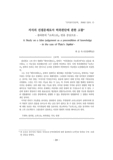

-
 * 본 문서는 배포용으로 복사 및 편집이 불가합니다.
* 본 문서는 배포용으로 복사 및 편집이 불가합니다.
미리보기
서지정보
· 발행기관 : 한국도덕윤리과교육학회
· 수록지 정보 : 도덕윤리과교육 / 46권
· 저자명 : 최순옥
목차
Ⅰ. 들어가는 말
Ⅱ.『소피스트』편에서의 허위판단 가능성에 대한 논의
Ⅲ. 맺는 말
참고문헌
초록
플라톤은 그의 후기 대화록『테아이테토스』편에서 “허위판단은 가능한가?”라는 물음을 제
기하고, 그 가능성을 타진해보지만 모두 난관에 부딪히고 만다. 이에 후속대화록인『소피스
트』편에서 전과는 다른 방식으로 논의를 전개하여 허위판단이 가능함을 논증해내는데 성공한
다.
그는 우선『테아이테토스』편에서 절대무로 해석해온 비존재를『소피스트』편에서는 ‘다름’
이라는 의미를 갖고 존재하는 것으로 재해석한다. 그리하여 비존재도 어떤 의미에서 존재한다
는 것이다. 다른 한편, ‘지식이란 무엇인가’라는 물음에 답하기 위해 인식을 위한 기본조건을
규명한다. 그것은 각기 다른 기능을 하는 두 요소, 즉 주어와 술어의 결합 형태인 명제이다.
이것은 존재하는 것에 대한 서술 기능을 한다. 이처럼 명제란 주어와 술어가 결합한 복합 형
태이므로 ‘다름’이라는 의미로 존재하는 비존재도 또한 명제의 한 구성요소가 될 수 있다. 그
런데 명제가 형성되기 위한 필요조건은 형상들의 결합가능성이다. 만일 결합 가능한 형상들끼
리 결합했다면 그것은 참명제이며, 결합할 수 없는 형상들끼리 결합했다면 그 결합은 허위명
제인 것이다.
이처럼 허위가 가능함을 보이려는 플라톤의 진의는 무엇일까? 소피스트들의 상대주의에 맞
서 객관적 진리가 있음을 보이고자 하는 숨은 뜻이 있다고 볼 수 있을 것이다. 또한 허위판단
에 대한 토론은 바로 지식개념에 대한 토론이다. 본고에서는『소피스트』편을 분석하여 이러
한 그의 프로젝트가 그럴듯한지 검토하고, 이것의 현대적 의의를 헤아리고자 한다.영어초록
In this study, I consider the Plato's argument for the possibility of false
judgement in Sophist with an analytic and critical method. The problem of falsity is
proposed in Theaetetus, but Plato couldn’t solve the problem. Having noted failure
there, Plato argues for the falsity in a different way in Sophist.
First of all, he interprets not-being as difference in Sophist. Accordingly, not-being
is seen to exist in a sense. Then he asks for the basic condition for knowing in
order to answer what a knowledge is. His answer is that it is a statement consisted
of subject and predicate, which makes knowledge possible. Not-being as difference
can be an element of statement because the statement is a complex form composed
of subject and predicate. A necessary condition for composition of statement is a
combination power of Forms. Therefore, in case when the Forms have a
combination power and are weaving together, they make a true statement. On the
other hand, in case when the Forms do not have a combination power and yet are
weaving together, they become a false statement.
What does Plato intend to show through this process of proving the falsity? First
of all, he wants to argue against sophists who always insist that statements must
be true, because there are no false statements. So, Plato intends to demonstrate the
existence of falsity in order to disprove sophists’ claims. Second, Plato intends to
explicate the falsity under the assumption that the study of falsity is the study of
knowledge.참고자료
· 없음태그
-
자료후기
-
자주묻는질문의 답변을 확인해 주세요

꼭 알아주세요
-
본 학술논문은 (주)학지사와 각 학회간에 저작권계약이 체결된 것으로 AgentSoft가 제공 하고 있습니다.
본 저작물을 불법적으로 이용시는 법적인 제재가 가해질 수 있습니다. -
해피캠퍼스는 구매자와 판매자 모두가 만족하는 서비스가 되도록 노력하고 있으며, 아래의 4가지 자료환불 조건을 꼭 확인해주시기 바랍니다.
파일오류 중복자료 저작권 없음 설명과 실제 내용 불일치 파일의 다운로드가 제대로 되지 않거나 파일형식에 맞는 프로그램으로 정상 작동하지 않는 경우 다른 자료와 70% 이상 내용이 일치하는 경우 (중복임을 확인할 수 있는 근거 필요함) 인터넷의 다른 사이트, 연구기관, 학교, 서적 등의 자료를 도용한 경우 자료의 설명과 실제 자료의 내용이 일치하지 않는 경우
“도덕윤리과교육”의 다른 논문도 확인해 보세요!
-
「조선녀성」에 드러난 북한의 가족과 자녀 교육에 관한 연구 23 페이지
본 연구는 북한의 조선녀성 을 대상으로 1993, 1998, 2003, 2008, 2013년 5개 연도에 걸쳐 48권 총 2,669편의 기사를 분석하고 북한의 가족과 자녀 교육 및 일상생활에 있어서 의 변화 양상을 살펴보았다. 조선녀성 은 2000년대 이후 발간 주기가 단축되고 지면이 늘어나면서 연간 편수가 증가했고, 2008년 이후의 자료에서 생활·.. -
독서탐구공동체 활동을 통한 어린이 철학수업이 자기존중감 및 인성교육에 미치는 효과- 자기책임을 주제로 - 27 페이지
현재 20년 가까이 꾸준히 추진되어 온 인성교육은 우리 사회에 핵심적 화두로서 교육 문 제의 근간을 이루고 있지만, 제반 학교문화와 청소년 문제로 인해 별다른 실효를 거두지 못 하고 있는 설정이다. 비록 현재 학교교육 내에서 인성교육을 위한 다양한 활동들이 이루어지 고 있지만, 불균형적인 그리고 주로 습(習)과 감정에만 치우친 예체능 위주의 편향된 형태의 .. -
빅터 프랭클의 삶의 의미론과 도덕교육적 함의 24 페이지
빅터 프랭클은 인간이 살아가고자 하는 이유를 알면 어떠한 고통과 실패도 극복할 수 있다 고 강조한다. 인간을 의미를 추구하는 존재로 본 프랭클은 삶의 의미로서 창조적 가치, 경험 적 가치, 태도적 가치를 제안하였다. 그 중 태도적 가치는 고통을 새롭게 해석하는 시도이며, 프랭클의 삶의 의미의 핵심이 된다. 프랭클의 삶의 의미는 청소년에게 고통에 대한 긍정적.. -
정신건강을 위한 도덕적 서사의 의의 36 페이지
이 논문은 도덕적 서사가 정신건강 일부 문제 해결에 도움을 줄 수 있음을 제안한다. 도덕 과 정신건강은 중복되는 영역을 가지며, 또한 서사는 도덕교육과 정신건강에서 활용되고 있다. 이에 정신건강에서의 서사적 접근 연구들을 개관하고, 두 주요 경향들인 인지 구성주의와 사 회 구성주의의 서사적 접근을 비판적으로 검토한다. 이 두 경향은 서사적 정합성을 추구한다.. -
대안학교 교육과정 분석과 도덕 교과 운영에의 시사점 29 페이지
본 연구는 미인가 대안학교(중학교)의 교육과정을 분석하여 도덕 교과의 교육과정 운영 에 있어서의 시사점을 도출하기 위해 진행된 것이다. 분석된 대안학교들은 전인교육, 인 성교육, 생태교육 등의 교육철학과 교육목표를 지향하는 가운데, 다양하고 특색있는 교육 과정을 편성?운영하고 있다. 또한 자기주도적 학습능력의 배양과 체험 및 참여 학습을 위 해 기획된 교수..
문서 초안을 생성해주는 EasyAI


